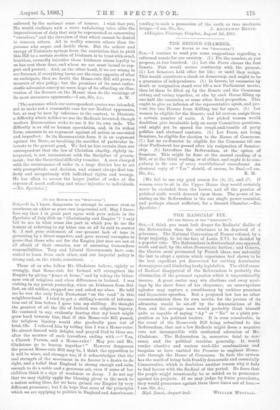THE RADICALS' FIX.
[TO Me EDITOR OF THE " SPECTATOR."] Sin, —I think you must look deeper for Radicals' dislike of the Referendum than the reluctance to be deprived of a grievance. The National Convention of France refused, by a large majority, to let the fate of Louis X VI. be decided by a popular vote. The Referendum in Switzerland was opposed, tooth and nail, by the ultra-Democratic faction; and Geneva, the Canton most permeated by French ideas, was naturally the last to adopt a system which experience had shown to be the best expedient yet discovered for curbing doctrinaire demagogues and hindering hasty legislation. The chief cause of Radical disapproval of the Referendum is probably the elimination of the personal equation which it unquestionably insures. A great orator may win elections and sway meet- ings by the sheer force of his eloquence; an unscrupulous agitator may capture a constituency by reckless promises and loquacious speeches. But a proposed law has no other recommendation than its own merits, for the praises of its advocates would be set-off by the denunciations of its foes, and the average man would probably think himself quite as capable of saying "Ay" or " No" to a plain pro- position as his political leaders. It is even conceivable, in the event of the Home-rule Bill being submitted to the Referendum, that not a few Radicals might deem a negative vote not incompatible with continued adoration of Mr. Gladstone. The Referendum is, moreover, fatal to cau- cuses, and the political machine generally. It would render abortive and useless such-like combinations and bargains as have enabled the Premier to engineer Home- rule through the House of Commons. In fact, the system has the merit of being both frankly democratic and essentially Conservative, which is doubtless another reason why it fails to find favour with the Radical of the period. He fears that the people might occasionally be so misled as to pronounce against his projects. If we may judge by Swiss precedents, they would pronounce against them three times out of four.—• I am, Sir, (Lc.,


































 Previous page
Previous page